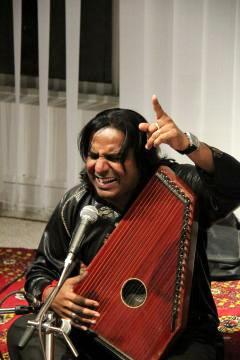
Sada-e-Watan
Sydney ™
sadaewatan@gmail.com

RajaTaseer sends a article about Shafqat Ali Khan who is coming on tour of Australia
Sham Chaurassi is a Gharana (musical heritage) in the classical music, known for the singing of vocal duets, most notably represented in modern times by the brothers Salamat Ali Khan and Nazakat Ali Khan. The Gharana is centered at a village of the same name in the Hoshiarpur district of Punjab (India).
Classical music in the subcontinent has evolved, both vocally and instrumentally. The human voice, however, has always been regarded as a divine instrument, most expressive and intense. In its migration from temple to court, classical singing has witnessed scores of changes in its form, design, structure, treatment and melodic moorings.
In the subcontinent it is represented by a number of stylistically diverse musical schools known as ‘Gharanas’.
Literally meaning ‘Family Tradition’, Gharana signifies a system of musical education and culture, where training was initially imparted only to members of the family and passed on from generation to generation.
Based on a traditional method of training, famously known as Ustad-Shagird Riwayat (Teacher-Student tradition), these institutions have prevailed in various fields of music.
The Gharana is believed to have been founded in the 16th century by Mian Chand Khan and Mian Suraj Khan who were contemporaries of Mian Tansen at the court of Mughal emperor Akbar. Successive generations of musicians in the Gharana specialized in the Dhrupad form of singing and evolved a tradition of duet vocal jugalbandi performances.
Mian Karim Bukhsh Majzoob, Ustad Ahmed Ali Khan, Ustad Niaz Hussain Shami, and Ustad Vilayat Ali Khan were some of the illustrious members of the Sham Chaurasi Gharana.
The township of Sham Chaurasia (Shaam = Evening, Chaurasi =84) was named after a cluster of 84 villages which constituted a land revenue unit in the time of Ranjit Singh. According to one legend, the founders were given a parcel of land here as a grant to them by Akbar.
Around the turn of the century, the Gharana was represented by Ustad Vilayat Ali Khan, who was noted for his dhrupad singing. His sons, Nazakat and Salamat, were to become particularly well known for their duet singing.
Nazakat and Salamat Ali Khan
Some of the most memorable classical music of modern times have been sung by the brothers Ustad Nazakat Ali Khan (1920s-1984) and Salamat Ali Khan (1934-2001). Salamat showed an early genius for music, and apparently they performed on radio in 1942, when Salamat was only 8. At the age of 11 he travelled with Nazakat to Amritsar for a memorable concert:
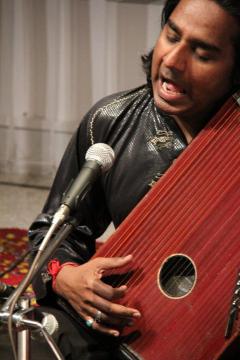
When the performance started, it seemed like a feast of musical notes had descended upon us in the audience. Every member of the audience was amazed and in complete awe of the duo. It was almost unbelievable that boys of that age could give such a fine performance. When the drut portion started, the brothers gave a blazing display of taans, sargams and layakari, which left the audience stunned.
After the partition, the family moved to Lahore and emerged as one of the leading performers of Classical music in Pakistan. Hameed Naseem of Radio Pakistan once remarked about them: Tansen issi tarah gata ho ga! (the legendary Tansen must have sung like this)
A number of their recordings exist from their very fruitful partnership (until 1974). Subsequently, they broke up, and Nazakat was to die shortly, but Salamat Ali Khan continued singing along with his sons Sharafat Ali Khan and Shafqat Ali Khan, who continue the Sham Chaurasia tradition today.
Shafqat Salamat Ali Khan: The youngest son of Salamat Ali Khan, Shafqat Ali Khan is a master of the tradition of classical music. Performing from the age of seven, when he appeared at the Lahore Music Festival, Khan has continued to attract attention with his soulful singing. He has been awarded many national and international awards including Pride of Performance in Pakistan. Also he received the Sarisvati and Indra Gandhi awards from India alongwith numerous distinctions from different countries of the world.
His performance encompasses exuberant complications, in which melodic gestures join hand waving and synchronized finger-pointing to form an eloquent symbiosis." Khan has received numerous awards including the Amir Khusro Award, as "best classical singer", in 1986, a Gold Medal from Fairslabad University in 1987 and a Gandhi Award from New Delhi University in 1995. Khan performed at the Folklife Festival of the Smithsonian Institution in Washington, D.C. in 1988 and 1996.
His family represents a 500 year lineage of musicians of the Shamchaurassi Gharana, descendants of two famed court musicians to the artistically-devoted Akbar the Great: Chand Khan and Suraj Khan.
He believes that it is going to be the western world where will we have to go to experience our culture. That our art is going to be relegated to drawing room chatter, our people reminiscing about the good old days when we had music.
His forbears are Chand and Suraj Khan of the Shamcharasi Gharana who performed in the court of Mughal Emperor Akbar. In 1947, Ustaad Salamat moved to Lahore. The family has been here since.
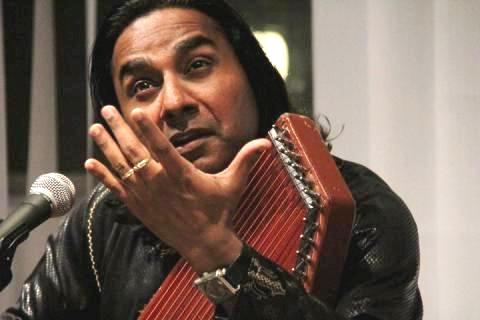
He views that coming from a long line of musicians and being the son of Ustaad Salamat helped. “I was thirsty for this, that matters,” he said, “But being Ustaad Salamat’s son will not carry you if you don’t have talent.”
So what does Mr. Khan think of the contemporary pop music scene that is ruling the charts and has spawned an entire industry? “There is a lot of talent in this country,” said Mr. Khan, “but people have become money-minded.” Not a purist by any means, Mr. Khan, like the late Nusrat Fateh Ali Khan, uses synthesizers and New World beats in his own works to make them more accessible and to keep the interest in raag alive.
“It’s difficult to survive if you’re a classical musician,” said Mr. Khan, “and that’s where the passion comes in. If you’re passionate, material gain does not matter and indeed follows. My father used to say, ‘Never make money a priority in your life. Follow the right path and you will reach your destination.’ ”
Mr. Khan debuted as a singer at the Lahore Music Festival in 1979. His career has taken him to destinations across the world. “I remember Paris,” said Mr Khan, “I was taken aback by the thunderous reception we received there.” He has also performed in the UK, Italy, Germany, Holland, Spain, Switzerland, India and Bangladesh.
In America, Mr. Khan has performed at the Smithsonian Institute in 1988 and 1996, the World Music Institute at New York’s Metropolitan Museum in 1988 and the Merkin Concert Hall in 1991. Mr Khan is presently a visiting professor at the University of California Berkley’s Center for New Music Audio and Technology. (His sister, who is married to an American musician, lives in San Francisco.)
The self-effacing Mr. Khan is also the recipient of numerous honours including the Amir Khusro Award (1986) and New Delhi University’s Gandhi Award (1995). He has recorded with Nimbus and HMV in the UK; WaterLily Acoustics in the US; Pakistan’s Folk Heritage; Holland’s Keytune Productions label; and India’s Westron, Plus Music, MegaSound and EMI. He plans on touring India later this year.
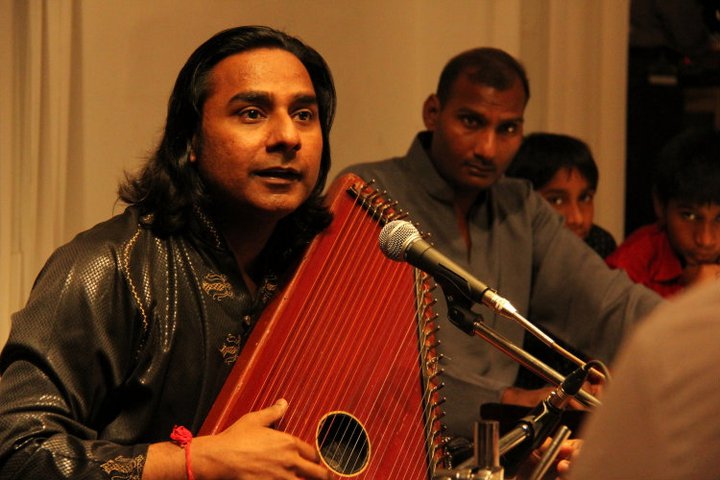
Mr. Khan’s foray into the world of fusion music began with the song, Teray Ishq Nachaya Ker Ke Thaya Thaya, produced by Bollywood’s Bappi Lahiri. “Other artists did cover versions and re-mixes and somewhere in there my name has been forgotten,” said Mr. Khan. Working in India was a strange experience. “Adnan Sami is one example of our artists finding greater appreciation there.” He said he had to fight off the temptation to relocate.
“The people in charge of record companies and the like should be promoting the classical arts. This mindset of formulaic success has had a tremendously adverse effect on our cultural heritage,” said Mr. Khan. “But we have lived here all our lives and we are well equipped to survive all obstacles by God’s grace.”
Mr. Khan prays five times a day, doesn’t smoke or drink. “My music includes praising God as He alone is worthy of it,” said the singer. “He will sustain us.”
Mr. Khan has got the experience to arrange workshops, trainings and seminars in the world and also the honor to teach music at different universities of the USA, Canada and Europe.
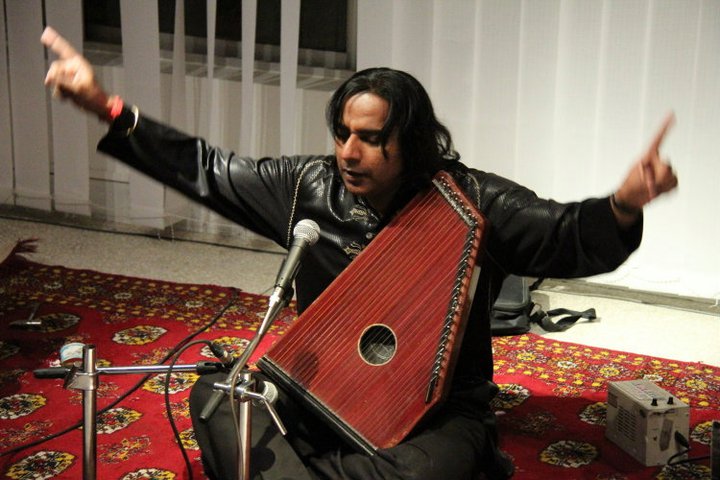
![]() Email Sada-e-Watan to a friend!
Email Sada-e-Watan to a friend!
![]()